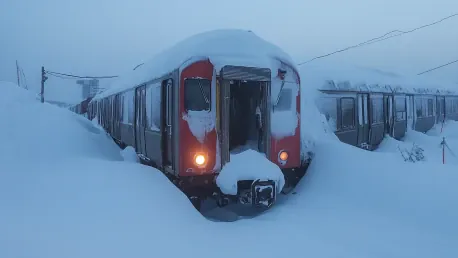During a winter cold snap in January, Merseyrail faced unprecedented challenges when heavy snow and ice in Merseyside caused significant disruptions to its train services. Nearly a dozen trains were trapped, leaving passengers stranded for several hours and raising questions about the preparedness and response mechanisms of the rail network. Metro Mayor Steve Rotheram expressed strong criticism towards both Merseyrail and Network Rail for their handling of the situation and initiated an independent review to diagnose the root causes and recommend measures to enhance future winter readiness.
Merseyrail’s Response to Winter Conditions
Trains Stranded and Services Suspended
Neil Grabham, Merseyrail’s managing director, explained the company’s course of action during the worsening weather conditions. By 9:30 AM, the situation had deteriorated sufficiently to warrant the highest level of incident declaration, resulting in a network-wide cessation of services. Passengers were advised to seek alternative transportation options, as 11 trains remained immobilized, including one at Old Roan for about three hours. The disruption continued for approximately five hours, during which commuters faced considerable inconvenience.
The incident highlighted significant concerns regarding Merseyrail’s capacity to handle extreme winter conditions effectively. Many commuters were left with limited information on the status of the rail services, exacerbating frustrations. This incident underscored the essential need for immediate and robust mechanisms to ensure continuity and safety during such extreme weather events. Clear communication, better infrastructure, and proactive measures should be seen as critical priorities for the rail industry.
Independent Review and Key Findings
In response to the chaos, Metro Mayor Steve Rotheram commissioned an independent investigation led by Greater Manchester’s transport commissioner, Vernon Everitt. With extensive experience from his tenure at Transport for London and recent work with Transport for Greater Manchester, Mr. Everitt was expected to deliver an impartial and comprehensive analysis of the incident. His objective assessment would address the rail industry’s readiness for extreme weather and scrutinize the response efforts made by Merseyrail and Network Rail.
Critical points emerged from the investigation into the disruption. One of the focal areas was the lack of effective communication between the rail operators and the passengers, which arguably heightened the confusion and discomfort experienced by commuters. Furthermore, the review identified a clear need for improved winter preparedness, encompassing both infrastructure resilience and operational strategies. These insights from the investigation were vital in determining actionable steps to prevent similar occurrences in the future.
The Impact on Commuters and Future Preparedness
Consequences for Daily Commuters
The severe impact of the suspension on daily commuters cannot be overstated. Thousands of individuals depend on reliable rail services to commute to work, school, and other essential activities. On that icy January morning, the abrupt halt of train services meant that many were left without feasible transport options, leading to delays and disruptions in their schedules. Beyond the immediate inconvenience, these failures eroded public confidence in the reliability of Merseyrail during adverse weather conditions, necessitating urgent attention and rectification.
Such incidents spotlight the need for a more resilient and responsive rail infrastructure. Commuters seek assurance that even in extreme weather, there will be robust contingency plans in place to minimize disruptions. Public trust is built on consistent and reliable services, which means rail operators must invest in both technological enhancements and strategic planning. Developing infrastructure to withstand severe weather conditions is not just about immediate solutions but about long-term reliability and safety for all passengers.
Communication and Technological Integration
Another significant takeaway from the investigation was the pressing requirement for better communication from the rail operators during such incidents. The lack of timely and accurate information left passengers in the dark, compounding their stress and frustration. Effective communication strategies, facilitated by advanced technological tools, can significantly mitigate the adverse effects of service disruptions.
Modern technology offers various solutions, such as real-time updates through mobile apps, social media platforms, and automated messaging systems, to keep passengers informed and guided in times of crisis. Integrating these tools into the operational framework can enhance transparency and passenger experience. Rail operators need to prioritize communication as a vital component of their service delivery, ensuring that passengers receive consistent and reliable information at all times.
Enhancing Future Resilience
Implementing Review Recommendations
The independent investigation, spearheaded by Vernon Everitt, is expected to offer a substantial framework for Merseyrail to improve its winter preparedness. The recommendations will likely cover infrastructure advancements, enhanced operational protocols, and more effective communication strategies. Implementing these measures is essential to boost the system’s resilience against extreme weather conditions and restore public confidence in its reliability.
Infrastructure improvements might involve upgrading tracks, trains, and signaling systems to endure harsh conditions. Operationally, developing comprehensive contingency plans will enable quicker, more effective responses to weather-related disruptions. Efficient communication plans should include proactive alerts, real-time status updates, and customer support mechanisms to guide and assist passengers during crises. These multi-faceted improvements will collectively strengthen the rail network’s ability to manage and mitigate adverse conditions in the future.
Future Considerations and Long-Term Goals
In January, Merseyrail encountered extraordinary difficulties when heavy snow and ice in Merseyside severely disrupted its train services. The icy conditions led to nearly a dozen trains being immobilized, leaving passengers stuck for hours and sparking widespread concern about the rail network’s preparedness and response to extreme winter weather. Metro Mayor Steve Rotheram did not hold back his criticism of both Merseyrail and Network Rail for their inadequate handling of the crisis. He has since called for an independent review to thoroughly investigate the reasons behind the service failures and to propose steps for improving winter readiness in the future. The objective is to ensure that similar weather conditions do not cause such widespread disruption again. This review aims to highlight any systemic flaws and provide actionable recommendations to bolster the rail system’s resilience against severe winter weather, safeguarding passengers and ensuring smoother operations during adverse conditions.









